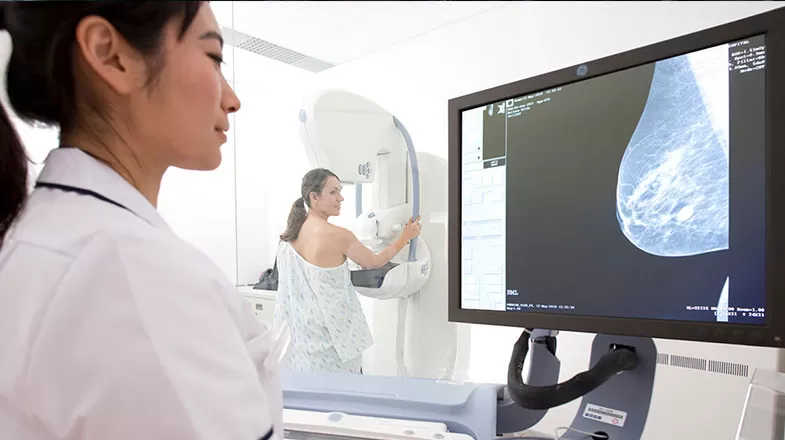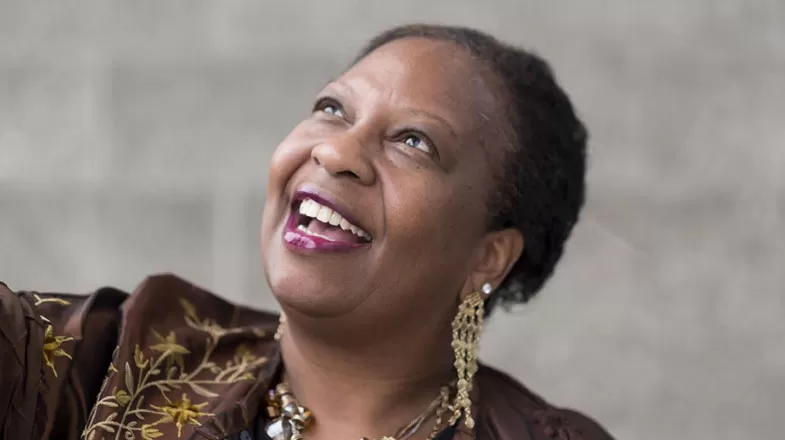Breast Cancer Articles
Featured Articles
Read our latest stories on the people and scientific innovations making a difference in patients’ lives.

Purpose & Ideals
Cancer Survivors' 'Butterfly Club' Network Fosters Support and Partnership
For many cancer survivors, life splits into two stages: before cancer and after cancer. That’s been the case for Lynette Bojko, Pfizer’s Head of Strategic Sourcing & Business Management. She was diagnosed with breast cancer just before her 40th birthday. “Unfortunately or fortunately, cancer is a lot of my identity,” she says. When treatment began, she didn’t want to hide what she was going through at the office, so she talked about it. That openness allowed her to connect with colleagues who...

Purpose & Ideals
Improving Metastatic Breast Cancer Care for Underserved Populations
Globally, breast cancer continues to be the most common invasive cancer in women, and one of the most common forms of cancer overall.1 While significant advances have been achieved, especially in metastatic disease, challenges beyond treatments remain, especially disparities created by structural, socioeconomic, socio-environmental, and biological factors. A recent 2021 publication reveals both the challenges facing underserved patient populations with metastatic breast cancer (mBC) in Europe...

6 Ways to Help Manage Stress After a Breast Cancer Diagnosis
Pfizer’s Chief Patient Officer, Dr. Freda Lewis-Hall, is partnering with other top health experts for the best tips on how to Get Healthy, Stay Healthy. Originally posted on Thrive Global.When you’re faced with a breast cancer diagnosis, stress levels can quickly reach an all-time high. Uncertainties about the future, worrying about treatment plans, balancing work, finances, and the sheer number of questions that occupy your mind can all play a role in building up this stress. And while there’s...

Breast Self-Exams: Should You Do Them?
For many years, we women were told to examine our breasts at least monthly to check for signs of breast cancer. In medical school, my fellow students and I learned how to teach our patients to examine their breasts. It’s a multi-step process that takes several minutes – checking your breasts in the shower, in the mirror, lying on your back (maybe you’ve seen diagram-heavy brochures -- still a staple in many college and community health centers). But in recent years, some medical organizations...

What Do You Really Know About Metastatic Breast Cancer?
As a public health initiative, breast cancer awareness has been generally successful. Patients, families, physicians, and advocates have worked diligently to make the disease better understood and synonymous with strength, survivorship and scientific breakthrough. With improved screening efforts and increasing numbers of available therapies, breast cancer is often discovered and treated in early-stage; as a result, a steady increase has occurred over the past 30 years in survival rates for...

Breast Cancer in the Workplace
Except for some kinds of skin cancer, breast cancer is the most common cancer in women in the U.S. According to the American Cancer Society, about 1 in 8 (12%) women in the U.S. will develop invasive breast cancer during her lifetime. Though possibly due to earlier detection and improved treatments, there is a slight decline in death from breast cancer in recent decades. Currently, there are more than 2.8 million breast cancer survivors in the U.S.With increased detection and survivorship, many...

Breast Cancer Isn’t Just a Woman’s Disease
When most people think of breast cancer, the chances are they don’t think about men. Most information and many of the images about breast cancer are geared toward women. Though breast cancer in men is rare (the chance of a man getting breast cancer in his lifetime is less than 1%), the numbers remind us that breast cancer does happen in men. It is estimated that in 2019: About 2,670 men will be diagnosed with breast cancer in the US. About 500 men will die from breast cancer in the US. In...

Breast Cancer in Men: Michael’s Story
In 2007, Michael Kovarik and his doctor discovered a lump near his left nipple, which was beginning to invert. Michael proceeded with the necessary follow-up as his doctor ordered a series of tests. When he heard the words breast cancer, Michael didn’t have the faintest idea that men could be affected by it. His immediate thought: it’s a woman’s disease. Dealing with his breast cancer diagnosis Michael was hesitant about sharing his diagnosis at first. “It took me a while to overcome my own...

Mammogram Myths and Facts
In the fight against breast cancer, screening mammograms can help healthcare providers check for breast cancer in women who don’t have any signs or symptoms of the disease. For example, among women 40 to 74 years of age, mammograms—X-ray pictures of the breast—have been shown to help reduce the number of breast cancer deaths. At age 50, regular screening mammograms are recommended for all women. However, mammograms are recommended as early as age 40 for women who have a family history of breast...

Real People
Esther’s Breast Cancer Journey: From How I Told My Kids to How I Give Back
Life is really good right now. I just had a birthday, and I’m happy to have had it, too! Getting here was challenging, but I was raised to persevere. Here’s my breast cancer story. My hope is that it will help other women who are going through a similar experience and inspire them to lend a helping hand to others.My breast cancer journeyTwelve years ago, I found a lump in my breast. My doctor checked it out and didn’t think it was anything to worry about. The plan was to keep an eye on it. Three...

Science & Innovation
New Discoveries in Metastatic Breast Cancer Can’t Wait: How Independent Scientific Research is Moving Forward Patient Care
Until the 20th century, breast cancer was considered an unspeakable condition, and in general, cancer was seen as an incurable disease.1 Thanks to increases in funding, research, and patient advocacy, there is greater awareness of and care for people living with breast cancer.2 But, for people with the most advanced forms of breast cancer, there still remain significant gaps in funding, research, and care. The Current State of Metastatic Breast Cancer Research Every year, millions of people...

Purpose & Ideals
Improving Care and Support for People Living with Breast Cancer
The facts around breast cancer raise cause for attention and most importantly, action.Worldwide, breast cancer continues to be one of the most common forms of cancer overall.1 And, with the global population aging, nearly 50% more women will develop and die from breast cancer in 2020 than in 2002.2 This statistic doesn’t include men, who also battle the disease, nor does it give the real picture with respect to certain populations.The quality of, and access to care among those diagnosed with...
Media Resources & Contact Information
Anyone may view our press releases, press statements, and press kits. However, to ensure that customers, investors, and others receive the appropriate attention, Pfizer Media Contacts may only respond to calls and emails from professional journalists.
